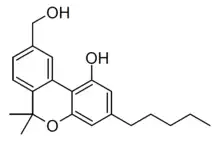 | |
| Identifiers | |
|---|---|
| |
| CAS Number | |
| PubChem CID | |
| ChEMBL | |
| CompTox Dashboard (EPA) | |
| Chemical and physical data | |
| Formula | C21H26O3 |
| Molar mass | 326.436 g·mol−1 |
| 3D model (JSmol) | |
| |
| |
11-Hydroxycannabinol (11-OH-CBN) is the main active metabolite of cannabinol (CBN), one of the active components of cannabis,[1] and has also been isolated from cannabis itself.[2] It is more potent than CBN itself, acting as an agonist of CB1 with around the same potency as THC, but is a weak antagonist at CB2.[3][4]
See also
References
- ↑ Yamamoto I, Kuzuoka K, Watanabe K, Narimatsu S, Yoshimura H (1988). "Metabolic formation and pharmacological effects of 11-hydroxycannabinol, an active metabolite of cannabinol.". In Chesher G, Consroe P, Musty R (eds.). Marihuana: an international research report. National Campaign Against Drug Abuse, monograph series No. 7. Canberra: Australian Government Printing Office. pp. 135–140.
- ↑ de A Leite J, de Oliveira MV, Conti R, de S Borges W, Rosa TR, Filgueiras PR, Lacerda V, Romão W, Neto ÁC (September 2018). "Extraction and isolation of cannabinoids from marijuana seizures and characterization by 1H NMR allied to chemometric tools". Science & Justice. 58 (5): 355–365. doi:10.1016/j.scijus.2018.06.005. PMID 30193661. S2CID 52175358.
- ↑ Yamamoto I, Watanabe K, Kuzuoka K, Narimatsu S, Yoshimura H (May 1987). "The pharmacological activity of cannabinol and its major metabolite, 11-hydroxycannabinol". Chemical & Pharmaceutical Bulletin. 35 (5): 2144–7. doi:10.1248/cpb.35.2144. PMID 3664823.
- ↑ Rhee MH, Vogel Z, Barg J, Bayewitch M, Levy R, Hanus L, et al. (September 1997). "Cannabinol derivatives: binding to cannabinoid receptors and inhibition of adenylylcyclase". Journal of Medicinal Chemistry. 40 (20): 3228–33. doi:10.1021/jm970126f. PMID 9379442.
This article is issued from Wikipedia. The text is licensed under Creative Commons - Attribution - Sharealike. Additional terms may apply for the media files.